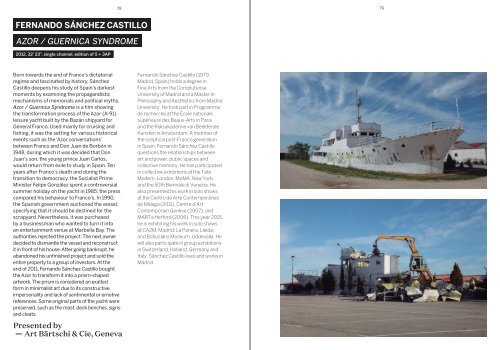SELECTED #10
You also want an ePaper? Increase the reach of your titles
YUMPU automatically turns print PDFs into web optimized ePapers that Google loves.
78<br />
79<br />
FERNANDO SÁNCHEZ CASTILLO<br />
AZOR / GUERNICA SYNDROME<br />
2012, 32’ 23’’, single channel, edition of 5 + 3AP<br />
Born towards the end of Franco’s dictatorial<br />
regime and fascinated by history, Sánchez<br />
Castillo deepens his study of Spain’s darkest<br />
moments by examining the propagandistic<br />
mechanisms of memorials and political myths.<br />
Azor / Guernica Syndrome is a film showing<br />
the transformation process of the Azor (A-91)<br />
leisure yacht built by the Bazán shipyard for<br />
General Franco. Used mainly for cruising and<br />
fishing, it was the setting for various historical<br />
events such as the ‘Azor conversations’<br />
between Franco and Don Juan de Borbón in<br />
1948, during which it was decided that Don<br />
Juan’s son, the young prince Juan Carlos,<br />
would return from exile to study in Spain. Ten<br />
years after Franco’s death and during the<br />
transition to democracy, the Socialist Prime<br />
Minister Felipe González spent a controversial<br />
summer holiday on the yacht in 1985; the press<br />
compared his behaviour to Franco’s. In 1990,<br />
the Spanish government auctioned the vessel,<br />
specifying that it should be destined for the<br />
scrapyard. Nevertheless, it was purchased<br />
by a businessman who wanted to turn it into<br />
an entertainment venue at Marbella Bay. The<br />
authorities rejected the project. The next owner<br />
decided to dismantle the vessel and reconstruct<br />
it in front of his house. After going bankrupt, he<br />
abandoned his unfinished project and sold the<br />
entire property to a group of investors. At the<br />
end of 2011, Fernando Sánchez Castillo bought<br />
the Azor to transform it into a prism-shaped<br />
artwork. The prism is considered an exalted<br />
form in minimalist art due to its constructive<br />
impersonality and lack of sentimental or emotive<br />
references. Some original parts of the yacht were<br />
preserved, such as the mast, deck benches, signs<br />
and cleats.<br />
Presented by<br />
— Art Bärtschi & Cie, Geneva<br />
Fernando Sánchez Castillo (1970,<br />
Madrid, Spain) holds a degree in<br />
Fine Arts from the Complutense<br />
University of Madrid and a Master in<br />
Philosophy and Aesthetics from Madrid<br />
University. He took part in Programme<br />
de recherche at the École nationale<br />
supérieure des Beaux-Arts in Paris<br />
and the Rijksakademie van Beeldende<br />
Kunsten in Amsterdam. A member of<br />
the sceptical post-Franco generation<br />
in Spain, Fernando Sánchez Castillo<br />
questions the relationships between<br />
art and power, public spaces and<br />
collective memory. He has participated<br />
in collective exhibitions at the Tate<br />
Modern, London; MoMA, New York;<br />
and the 50th Biennale di Venezia. He<br />
also presented his work in solo shows<br />
at the Centro de Arte Contemporáneo<br />
de Málaga (2011), Centre d’Art<br />
Contemporain Genève (2007), and<br />
MARTa Herford (2006). This year 2015,<br />
he is exhibiting his work in solo shows<br />
at CA2M, Madrid; La Panera, Lleida;<br />
and Bohusläns Museum, Uddevalla. He<br />
will also participate in group exhibitions<br />
in Switzerland, Holland, Germany and<br />
Italy. Sánchez Castillo lives and works in<br />
Madrid.



